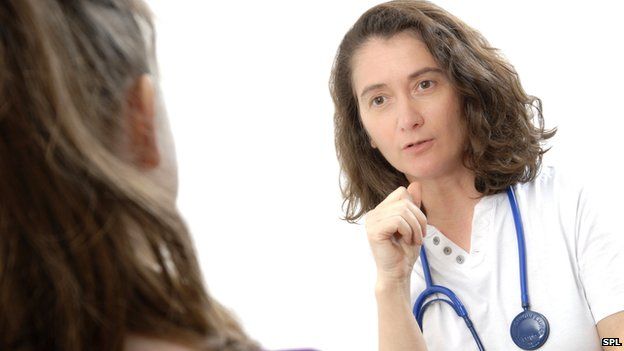Doctors may be 'too slow' on cancer
- Published

GPs in the UK are slower to refer patients who might have cancer than in other countries, a study suggests.
Interviews with 2,795 doctors around the world, in the journal BMJ Open, suggested British doctors did not have enough access to CT and MRI scans to check for tumours.
Cancer Research UK suggested this could contribute to the UK lagging behind on cancer survival.
Early detection of tumours is vital for effective treatment.
The study involved giving doctors in the England, Wales, Northern Ireland, Norway, Sweden, Australia and Canada a series of hypothetical scenarios during a phone interview.
This included a 53-year-old woman who had her last period six months ago and had suffered abdominal pain for the last three weeks.
These are potential symptoms for ovarian cancer, but could also be many other diseases.
In the UK, 38% of doctors said they would refer the patient for cancer testing while the figure was 61% in the other countries.
Cancer Research UK said the percentage of ovarian cancer patients surviving one year or more after diagnosis was 65% in the UK and 73% in the rest of the world.
It was a consistent theme throughout all the scenarios.
'Difficult job'
Sara Hiom, the director of early diagnosis at Cancer Research UK, said: "This work adds important detail to the complex problem of why the UK's cancer survival lags behind other comparable countries.
"GPs have a difficult job to do. They have to ensure those who need specialist tests get them, without overloading a health system that's already strained.
"But their role as gatekeepers to further investigation and specialist care does need to be reviewed in the current context.
"If the UK system means that patients are not being referred for tests, or GPs aren't able to get a specialist opinion as necessary, then this can contribute to cancers being diagnosed and treated at a later stage and we urgently need to address this."
Dr Richard Roope, a representative of the Royal College of GPs, said most doctors in the UK did not have direct access to CT and MRI scans, which meant they were likely to try other tests first.
Another issue he identified was that doctors tested for one condition at a time, while other countries tested for all possibilities at once.
But he told the BBC News website the NHS was doing well despite less funding that other countries: "What we deliver for what we spend is impressive, but the outcomes are not as good."